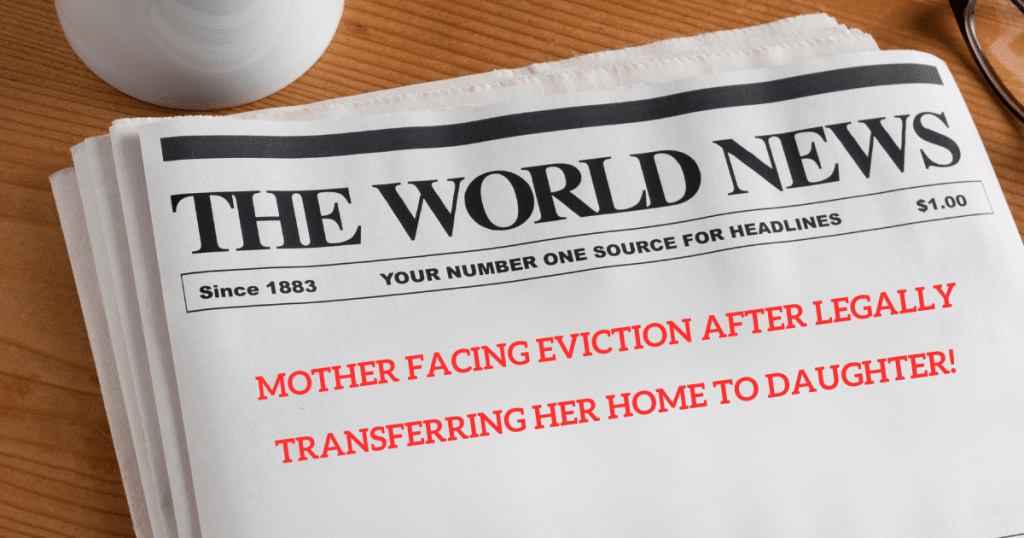


__________________________________________________________________________________________
__________________________________________________________________________________________
These are headlines, and they make shocking reading. However, these headlines relate to a true story and one that happened in England.
As a Private Client Solicitor I am often consulted by clients who have one question “Can I gift my house to my child?”
Legally if you own your property, you can do whatever you want with it. But when I am being asked this question by a client, my follow up question is “Why would you want to do that?”. For the majority of clients, the response is that they want to avoid inheritance tax or care home fees.
The headlines above relate to a lady that wanted to potentially reduce her inheritance tax liability. By all accounts she employed a legal representative to gift her flat to her daughter, so to minimise her inheritance tax bill on her death. However, things went awry many years afterwards.
There are many ways to reduce your inheritance tax bill and gifting your residential home should be a last resort. Any trained private client solicitor would have looked at the reasons for the lady wanting to potentially gift the property and the various ways that could be considered, so that the gifting of the property did not have to happen. My simple advice is to always consult a private client solicitor who is either a member of Solicitors for the Elderly (SFE) or the Society of Trust & Estate Practitioners (STEP) or both, to get the best legal advice you can on this subject. Don’t just opt for any solicitor or so-called lawyer.
From the reporting of this case, it seems that Norma (the Mother) believed that she had a potential Inheritance Tax Liability, which is quite likely. She owned her flat in London and it is reported to be worth approximately £1.4million. A person who owns a property and is based in the UK and a UK national, would have the Basic Nil Rate Band for Inheritance Tax at £325,000 and then a Residential Nil Rate Band of a further £175,000. This means that she would have to potentially pay 40% tax on any assets over £500,000.
A person can complete a Potential Exempt Transfer (PET) of any asset, as long as they survive 7 years from the date of the gift.
For example, Fred has one daughter and owns a house worth £175,000 and he is happy in his home and does not intend to move. He has cash in bank accounts and investments of £600,000. Fred has a comfortable income and does not need all his savings. Fred without gifting would potentially have a tax liability of;
£175,000 + £600,000 = £775,000 less BNRB and RNRB of £500,000 = £275,000 at 40% = £110,000 in inheritance tax to be paid.
Daughter would receive £665,000 from Fred
If Fred gifted half of his cash to his daughter, and survived 7 years after doing so, this would mean he would have a tax liability of;
£175,000 + £600,000 = £775,000 but he gifts £300,000 to his daughter leaving him with £475,000 less BNRB and RNRB of £500,000 = £0.00 in inheritance tax to be paid.
Daughter would receive £300,000 from Fred and then later would receive £475,000 – total £775,000 from Fred
From the above there can be advantages to gifting assets. However, cash is much easier. Gifting of a home is a very tricky and complex situation, as Norma found out.
Firstly, for a gift to work for inheritance tax purposes, the gift must be without reservation of benefit. This means that many people gifting their home, the purpose fails, as they remain in the home, meaning that HMRC will not recognise it as being gifted and still tax the asset.
In Norma’s case she has not died and therefore the gift to her daughter has not been tested by HMRC to see if their was a “gift with reservation of benefit”, which it is highly likely it would be caught if she was still residing in the property and not paying a full market rent.
In Norma’s case she has been caught out by the fact that she has “gifted” her property. She has therefore legally signed the Title Deeds over to her daughter. Although at the time this may have seemed like a good idea, as years pass relationships and situations change.
I am presented in professional life with the fact that many people cannot let go of an asset that easily. When you “gift” a property, you do exactly that, which means it is no longer yours to do with as you please. You let go of all control. If you cannot do this and can never see the property as belonging to your child, for them to do with as they please, then do not gift it away. You must be able to see the transaction as passing it to a complete stranger.
Cash is easier to part with, than a home that you have built, scrimped and saved for, for over 40 years.
Then there is the issue of changing relationships, which appears to have happened in this case. Not everyone reacts to change in the way that you would hope, and they can do strange and wonderful things, which seems to be the issue in Norma’s case. A change in relationship has caused the Judge to comment that her daughter has been pushed to her limits by the actions of her mother. Neither Mother or daughter at the time of the gift would have foreseen the events that have led to this Court ruling. However, as a Solicitor advising a client about gifting a property to a child, we would always advise against such action due to this potential change.
This reported case may seem extreme, and you may think that it could not happen to you, but things happen in life that are very unexpected. It is important that before gifting a property you take proper advice and be aware of all the complications of what may appear to be a simple, risk free act before acting and potentially ending up in Court and losing your home, like is what has happened in this case.
There are many reasons that we would advise not gifting a property to a child and these can be;
If you have any concerns at all after reading this article, please do get in touch.

Ginette McCaffery – Specialist Wills, Probate & Trusts Solicitor
Dated: 28.07.2023
Call us now, our phone lines are open 24 hours a day, 7 days a week 01302 349 480 or fill out our enquiry form here
Our friendly staff are on hand to answer any of your questions.